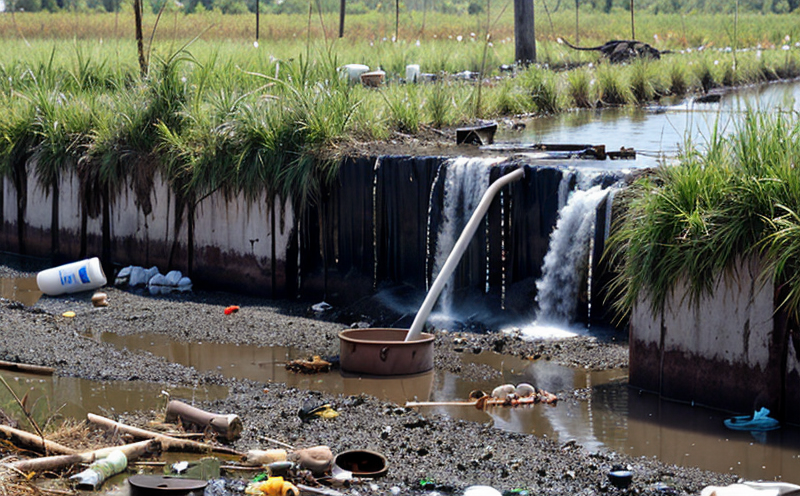Vegetable Oil Pollutant Testing
The testing of vegetable oils to identify pollutants is a critical process in ensuring the quality and safety of oil products. Vegetable oils are widely used in various sectors, including food production, pharmaceuticals, and biofuels. Pollutants can originate from multiple sources such as manufacturing processes, storage conditions, or contamination during transportation. Ensuring that these contaminants do not exceed safe limits is essential for maintaining product integrity and compliance with regulations.
Our laboratory offers comprehensive testing services to identify pollutants in vegetable oils using international standards like ISO 13523-4, ASTM D6709, and EN 14528. These tests are designed to detect a wide range of contaminants including water content, free fatty acid (FFA) levels, peroxide value, and other indicators that can affect the quality and shelf life of vegetable oils.
For accurate testing, we follow strict laboratory protocols. Specimens undergo rigorous preparation steps such as degumming, neutralization, and filtration to ensure purity before analysis. Our state-of-the-art equipment allows us to perform precise measurements and provide detailed reports that meet your specific needs. Whether you're a food manufacturer looking for quality control or an R&D engineer seeking innovative solutions, our services can help you stay ahead of the curve.
Our testing methods are tailored to identify not only common contaminants but also emerging pollutants that could pose risks to health and safety. By leveraging advanced analytical techniques, we ensure accurate results that comply with global standards. This approach helps clients make informed decisions regarding product development, quality assurance, and compliance management.
| Contaminant | Description | Testing Method |
|---|---|---|
| Water Content | The amount of moisture present in the vegetable oil. | Drying and weighing techniques as per ISO 13523-4. |
| Free Fatty Acids (FFA) | Unsaturated fatty acids that have lost their carboxyl groups due to hydrolysis. | Acid value determination using ASTM D6709. |
| Peroxide Value | An indicator of the degree of lipid oxidation in oils and fats. | Reagent-based peroxide value testing according to EN 14528. |
The importance of vegetable oil pollutant testing cannot be overstated. By detecting and quantifying contaminants early, businesses can prevent costly recalls and protect their reputation. Our experienced team uses cutting-edge technology and adheres strictly to international standards to deliver reliable results every time. Contact us today to learn more about how our services can benefit your organization.
Why It Matters
The quality of vegetable oils is crucial not only for maintaining product safety but also for environmental sustainability and consumer health. Pollutants in these oils can have detrimental effects on human health if consumed, leading to potential health issues such as digestive disorders or allergic reactions. Additionally, poor-quality oil can lead to reduced shelf life and increased production costs.
From an environmental perspective, ensuring the purity of vegetable oils helps reduce waste generation and promotes sustainable practices throughout the supply chain. By identifying pollutants early, manufacturers can implement corrective measures that minimize their ecological footprint. This aligns with broader goals of reducing carbon emissions and promoting circular economy principles.
Compliance with regulatory requirements is another key reason why vegetable oil pollutant testing matters. Governments around the world have implemented strict regulations governing food safety and environmental protection. Adhering to these standards ensures that businesses operate legally and avoid potential fines or penalties.
In summary, thorough pollutant testing of vegetable oils not only enhances product quality but also contributes positively to both human health and environmental sustainability. It enables companies to produce safer products while fostering responsible business practices.
Industry Applications
| Industry Sector | Pollutant Testing Needs |
|---|---|
| Bakery and Confectionery | Detecting contaminants that could affect the flavor, texture, or shelf life of baked goods. |
| Pharmaceuticals | Evaluating purity levels to ensure compliance with regulatory guidelines. |
| Biofuel Production | Monitoring pollutant levels in biodiesel and other biofuels for quality assurance purposes. |
Our testing services find application across diverse industries where vegetable oils play a significant role. For instance, in the bakery sector, detecting pollutants helps maintain consistent product quality. In pharmaceuticals, ensuring purity is paramount for safe consumption. And within biofuel production, monitoring pollutant levels ensures the efficacy and performance of alternative fuel sources.
Our laboratory also supports research & development efforts by providing reliable data that can guide innovation in new products or processes. By partnering with us early on, stakeholders can gain valuable insights into potential challenges and opportunities associated with their projects involving vegetable oils.
Environmental and Sustainability Contributions
- Pollutant Reduction: Early detection allows for proactive measures that can significantly reduce the amount of pollutants entering the environment.
- Resource Conservation: Ensuring oil purity helps extend product lifespan, thereby conserving resources and reducing waste.
- Energy Efficiency: Cleaner oils contribute to more efficient machinery performance, ultimately saving energy costs.
Incorporating vegetable oil pollutant testing into your operations is a step towards fostering greater environmental responsibility. By adhering to stringent quality standards, businesses can play their part in promoting sustainable practices and contributing positively to global efforts aimed at reducing pollution.





